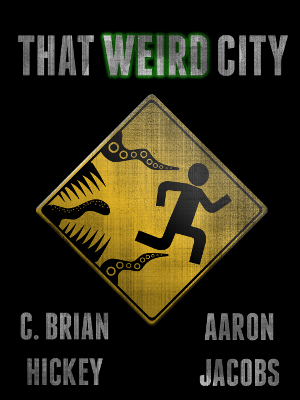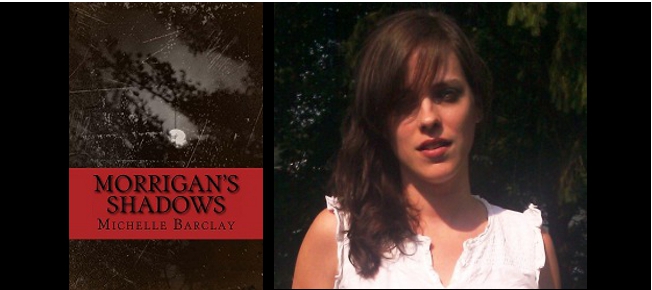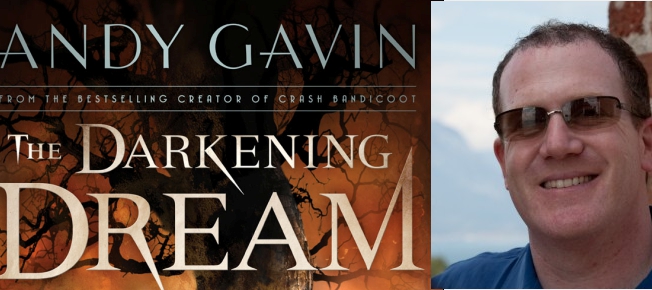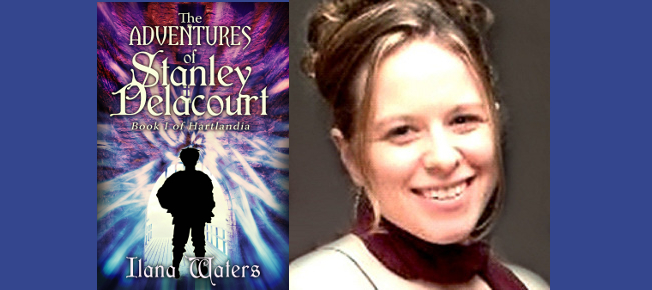In our latest interview, I talk with Aaron Jacobs and C. Brian Hickey about their new urban fantasy/horror anthology That Weird City, out now for the Amazon Kindle. We connect the dots between H. P. Lovecraft and Robert Howard, discuss black magic and other forms of tech support, and dig into the workings of the indie writing world.
The Indie Mine: Aaron, C. Brian, thanks for taking the time to talk with us. Before we get to That Weird City, can you talk a little bit about your backgrounds and how you started collaborating?
Aaron: Hello, and thanks for having us. My background is that I’ve always been writing weird shit – one of the earliest stories I remember writing was as a seven or eight year old, getting Barlowe’s Guide to Extraterrestrials as a birthday present from my father and putting together some strange story where an Old One (which I took to mean like a crotchety old man alien) takes his half alien, half husky The Thing out on a walk and discovers buried treasure. Based more on the illustrations and names than any sort of cogent background info, but I like to think that writing the equivalent of HP Lovecraft/John Carpenter mashup fiction before hitting puberty gives me a leg up on the weird horror/fantasy. Since then I’ve just been writing down every bizarre thing my brain comes up with, and that’s how I mesh well with Chris. I’ve known him for… Christ, close to a decade now and most of that has been us badgering each other to write more. We decided last year that our styles are complementary, and that maybe if we both jumped at the same time we’d have enough false bravado between the two of us to actually self-publish something.
C. Brian: Yeah, I come from that same sort of early childhood brain-rewiring. When I was little, my dad had this great big box of pulp novels from the ’60s and ’70s–tons of Edgar Rice Burroughs, Howard’s Conan stories, maybe a little Lovecraft–and even before I could read, I’d get the stories from those gorgeous covers. That set the tone for the sorts of things I read as a kid; while the other children were getting the The Lion, The Witch, and The Wardrobe, I was sneaking Stephen King into my bookbag instead. It wasn’t until I was thirty, though, when a buddy of mine let me read Harlan Ellison’s Deathbird Stories, that I knew I wanted to be a writer. My discipline was for shit before then, so I think the idea landed on me at the right time.
Besides, and I think Aaron will back me up on this, if you have the predisposition to write, and you don’t do it, you go crazy.
The Indie Mine: With those influences it’s not hard to guess the overall shape of That Weird City, but Howard to Lovecraft is a rather wide range. Can you tell us a bit more about the book itself, and what catapulted it into the “write or go crazy” level for both of you?
C. Brian: I blame Aaron.
One day last year, he suggests we do a little experiment. Ten stories, five stories apiece, six thousand words per story, kick it up to Amazon, see what happens.
ONE YEAR LATER
Aaron: I think that in spite of the wide range, one of the coolest things about Howard and Lovecraft is how they buddied up and interwove their stories together so that Conan and company could have conceivably lived in the Lovecraft universe. Bran Mak Morn certainly did, what with the Worms of the Earth. I promise this isn’t a random pulp fiction tangent; that interwoven feeling one of the elements we tried to bring to That Weird City, and in fact provided some of the inspiration for the book. We thought it would be cool to take a bunch of the most mundane, normal things in the real world (GPS nav systems, technical support, DJing) and put together a common mythology of strange things happening behind the scenes. Sharing a universe gave it a bit more weight too, made it feel like the whole planet could have bizarre stuff happening right under our noses instead of an isolated case of two like traditional horror stories. Once we decided to use that as a skeleton for the anthology, everything grew very organically. We brainstormed a handful of possible story ideas and they all sounded too cool not to write, if that makes sense.
C. Brian: Also, bear in mind: “write or go crazy” wasn’t just the battle cry for this collection. It’s often said that writing isn’t a career; it’s an affliction, and I think that’s absolutely true in our cases.
The Indie Mine: As a fan of short stories in general that’s really interesting; I’m only a few stories in and didn’t realize you’d deliberately put them into a shared universe. Do you have any plans to come back and add to that world, or have any favorite ideas or characters you want to revisit?
Aaron: We kept them deliberately separate so it wouldn’t feel like some kind of novella with disparate chapters, but there are some key phrases and themes we try to keep consistent throughout, based mainly off Chris’s Jason December serials. He has some cool ideas on the astral plane and outsides that I had to rework some of my stuff to adhere to. I’d definitely like to revisit some of the characters I came up with for this, though. I have some twists on the vampire legend that I had to cut due to pacing problems, and I want to expand upon the idea of magitechnical support in general.
The Indie Mine: I remember waiting for each Jason December story to show up on Weaponizer, so I’m excited to hear you’re both expanding on that world. Switching gears for a moment, what was it like moving from a web-based serial to print? Any lessons from your run on Weaponizer that helped make That Weird City a reality? Any changes or challenges you didn’t see coming?
Aaron: I’ll let Chris take this one since he has the experience with actual serials instead of just shorts and flash fiction, but I do think even doing the one-off pieces for Weaponizer were fantastic prep for That Weird City. Good training for deadlines, handling criticism and putting work out in front of a large audience without having a panic attack. I will say that working on That Weird City made me want to try some serialized stories myself some day, if I can tear myself away from novel-writing long enough.
C. Brian: I always think of Weaponizer as physical therapy for my brain. I was coming off a long blockage, and submitting stuff was absolutely key in getting my discipline in line. The serials were an evolution in that, having the confidence to try longer-form fiction.
The Indie Mine: That kind of discipline must come in handy when you don’t have a publisher waiting for a draft. What can you tell us about the process of publishing independently? What did you learn along the way?
Aaron: That it’s never as easy as it sounds at first. When we went into this, we were quite literally thinking “we’ll write this up in a month, have it edited a week after that, and then upload it.” MONTHS LATER, here we are publishing and promoting it. Not that that’s necessarily a bad thing, as our product would have been absolute trash without the polish we’ve have time to put on it. The other major thing, while it hasn’t directly impacted us yet, is reading up on self publishing and finding that it really is a bit of a wild west scenario out there right now. It’s very difficult to attract attention without a professional advertising campaign just because of the sheer amount of books going online at an hourly basis, but at the same time traditional publishers are as selective as ever. When you hear about breakout self publishers, they’ve typically gained a fan group through traditional publishing (or more rarely, sheer force of personality) and then splintered off to do their own thing with more freedoms and greater rewards for the risk, ala Trent Reznor.
C. Brian: The most important thing we’ve learned is that you don’t need anybody’s permission to do something like this. With the channels opening up, and the technology opening up, if you want to make something–a book, an album, a podcast, whatever–you can just go do it. That’s a powerful thing.
The Indie Mine: That’s one of the most exciting aspects of the indie community; we see so many great ideas that might never have seen the light of day a few years ago. Plus, when we talk to indie game developers, it seems like the community is very willing to share information and advice to help other creators. Does the wild west mentality dominate the independent writing community, or did you find a similar level of support?
Aaron: I think that it’s been very supportive. There’s a whole slew of sites out there dedicated to self publishing advice, for free, and almost always advocating that new writers try to make mutually beneficial connections. There’s this vibe I’ve gotten from the self publishing community as a whole that eschews the more cutthroat world of traditional publication and prefers working together as creators. I forget the site that said it, but back when we were originally researching one particular quote really stood out to me in regards to twitter advertising – authors should always retweet and help each other out, because it’s better for someone to sell some stories than no one.
C. Brian: Everybody we’ve gone up to with a question or for advice has been extremely helpful so far. I think the Wild West metaphor only holds up as far as people racing to stake a claim in a new frontier. If you’re clever, and have a good product, you can make a little money. If you’re lucky on top of that, you can make a whole lot of money. As long as you don’t go in looking for a big payday, you’ll do well.
I honestly thought we’d only sell maybe ten copies, and use it as proof-of-concept. Everything beyond that is extra.
The Indie Mine: Is there anything else you’d like to share with our readers who might be interested in That Weird City, or with other writers considering independent publishing?
Aaron: The best advice I can offer, honestly, is to just go for it. It’s easier than ever to put your stuff out there to read, and if you have a good story bubbling inside you it’s criminal not to take advantage of just how simple and risk-free self publishing has become. There really is no better feeling than selling even one or two books. And if anyone does decide to buy our book after reading this, thank you in advance and I sincerely hope you find it enjoyable.
C. Brian: Agreed. In most cases, it’ll cost you nothing but your hard work, and who knows? You might hit it big.
The Indie Mine: Aaron, C. Brian, thanks for taking the time to talk with us, and best of luck with That Weird City. We’ll look forward to seeing what’s next for both of you.
C. Brian: Thanks–this was fun!
Aaron: Yeah, thanks again for having us. It was great.
© 2012, The Indie Mine. All rights reserved.





